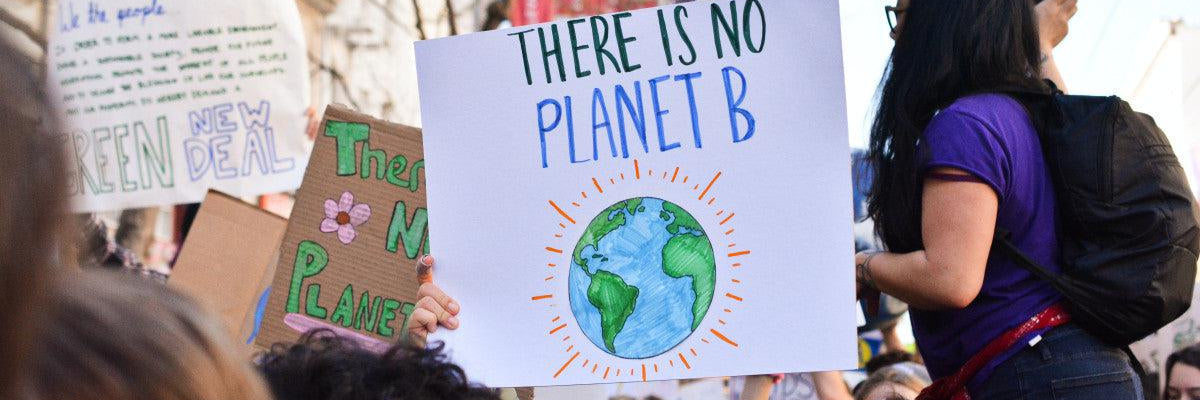Qu’est-ce que le greenwashing ?
3 juillet 2021

Le greenwashing (aussi appelé "éco-blanchiment" en français) est une technique marketing trompeuse qui a pour finalité de donner à une entreprise une image engagée en faveur de l’environnement sans que cela soit le cas. C’est une méthode qui est utilisée dans de nombreux secteurs d’activités : alimentation, mode, cosmétique, automobile, tourisme... Dans la plupart des cas, les dépenses réalisées par les entreprises pratiquant le greenwashing se concentrent en réalité plus sur la publicité, que sur de vraies actions écologiques.
Quels outils sont utilisés par les entreprises qui pratiquent le greenwashing ?
-
L’utilisation d’éléments visuels comme des déclinaisons de couleurs vertes, des photos de paysages naturels, l’intégration d'emojis faisant référence à l’écologie (c’est quelque chose que l’on retrouve beaucoup dans les biographies Instagram de certaines marques par exemple)
-
L’utilisation du champ lexical lié à la nature et à l’écologie “origine naturelle", “équitable”, "éthique'', “responsable”, “durable”, sans vraies preuves des propos avancés derrière. Par exemple, de nombreuses marques de fast fashion proposent des pièces (notamment des tee-shirts) avec des inscriptions de slogans écologiques : “there is no planet B” ; “keep the earth protected” ; “enjoy the ocean” etc… Or, si l’argument est juste marketing et que l’engagement écologique ne va pas plus loin, (par exemple si le t-shirt est composé de matières synthétiques) alors c'est du greenwashing.
-
L’utilisation de faux labels ou de fausses affirmations. Par exemple, on voit souvent des marques écrire dans la description de leurs produits “coton 100% naturel” ou pire “coton 100% biologique”, “coton durable”, alors qu’elles ne possèdent en réalité aucune certification pour prouver ce qu’elles avancent.
- D’ailleurs, il paraît important de parler du label BCI, auquel de nombreuses marques de fast-fashion adhèrent. Le label BCI - “Better Cotton Initiative” promet une meilleure utilisation du coton, en étant notamment plus respectueux de l’environnement et des travailleurs de cette industrie. Quel est le problème ? Ce label est souvent associé à du coton biologique, alors qu’il n’interdit absolument pas l’utilisation d’OGM ou de pesticides. Pire encore, le coton BCI à un effet pervers sur le coton bio car de nombreux producteurs de coton finissent par arrêter de produire du coton biologique pour passer à du coton BCI, du fait des exigences qui sont moindres.
-
Tout simplement le manque de transparence concernant le mode de fonctionnement de l’entreprise, sa production et la composition des produits.
En tant que consommateur, comment démasquer le green washing ?
Déjà, un des premiers indicateurs est de regarder la démarche de responsabilité globale de l’entreprise : avoir un regard critique, prendre du recul pour ne pas se faire happer par la forme et le ton mis en avant et par toutes les techniques marketing utilisées (comme celles citées précédemment). Par exemple, allez voir les pages “manifesto”, “nos engagements” ou “la marque”, c’est-à-dire les pages où les marques s’expriment par rapport à leur engagement, leur missions etc...
Puis, dans le cas des discours qui semblent un peu flous, ne pas hésiter à aller chercher les informations ailleurs pour vérifier leur crédibilité.
Vous pouvez aussi vérifier les labels, notamment si c’est un label dont vous avez peu entendu parlé auparavant.
Que dit la loi ?
Plusieurs acteurs s’intéressent au greenwashing.
L’ARPP (Autorisation de Régulation Professionnelle de la Publicité), un organisme privé d’autorégulation de la publicité en France ne peut pas sanctionner les entreprises qui font du greenwashing. Son rôle est uniquement d’encourager “une publicité loyale, véridique et saine”.
L’ADEME (Agence de la transition écologique) travaille aussi avec l’ARPP afin de limiter le greenwashing car selon cet organisme, il participe à la désinformation des consommateurs.
Finalement, c’est en avril 2021 que le projet de loi nº 3875 portant sur la lutte contre le dérèglement climatique et renforçant la résilience face à ses effets a permis d'interdire (“à compter d’un an suivant l’entrée en vigueur de la présente loi”) la publicité “en faveur des énergies fossiles” et de “réduire de manière significative les communications commerciales audiovisuelles relatives à des biens et services ayant un impact négatif sur l’environnement”, mais aussi de durcir et de simplifier la mise en place de sanctions contre le greenwashing et les pratiques commerciales trompeuses. Ainsi, avec ce projet de loi, le montant de l’amende pourra passer de 50% des dépenses utilisées pour la réalisation de la publicité ou de la pratique de greenwashing à 80% !
Le greenwashing n’est pas la seule technique marketing trompeuse utilisée par les marques, il y a aussi depuis plusieurs années maintenant ce que l’on appelle le féminisme washing. Nous avons d’ailleurs écrit un article à ce sujet :)
Chez Elia, la transparence est au cœur de notre ADN et nos engagements sont réels ! Si vous souhaitez en savoir plus, vous pouvez consulter nos pages engagements pour la lutte contre l’endométriose, notre démarche d'éco-responsabilité ainsi que les dessous de la production de nos culottes menstruelles et sur notre Instagram !
Sources : https://www.wedressfair.fr/blog/le-greenwashing
https://www.hellocarbo.com/blog/communaute/greenwashing-exemples/
https://www.assemblee-nationale.fr/dyn/15/textes/l15b3875_projet-loi#D_Article_4


Commentaires